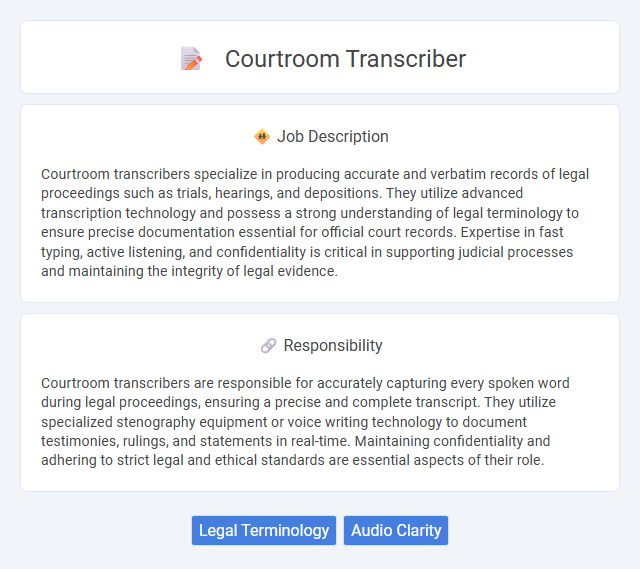
Courtroom transcribers specialize in producing accurate and verbatim records of legal proceedings such as trials, hearings, and depositions. They utilize advanced transcription technology and possess a strong understanding of legal terminology to ensure precise documentation essential for official court records. Expertise in fast typing, active listening, and confidentiality is critical in supporting judicial processes and maintaining the integrity of legal evidence.
Courtroom transcribers may be most suitable for individuals with strong attention to detail and excellent listening skills, as the job requires accurately capturing spoken words in real-time. People who prefer a quiet, focused work environment and possess the ability to stay calm under pressure could probably adapt well to this role. Those who struggle with multitasking or high-stress situations might find this job challenging or less suitable for their strengths.
Qualification
Courtroom transcribers must possess exceptional typing speed, typically exceeding 225 words per minute, and a thorough understanding of legal terminology and procedures. Certification from recognized bodies such as the National Court Reporters Association (NCRA) or equivalent credentials is often required to ensure accuracy and professionalism. Strong listening skills, excellent attention to detail, and proficiency with stenography machines or voice writing technology are critical for successful transcription in high-pressure courtroom environments.
Responsibility
Courtroom transcribers are responsible for accurately capturing every spoken word during legal proceedings, ensuring a precise and complete transcript. They utilize specialized stenography equipment or voice writing technology to document testimonies, rulings, and statements in real-time. Maintaining confidentiality and adhering to strict legal and ethical standards are essential aspects of their role.
Benefit
Courtroom transcribers likely provide accurate and reliable records of legal proceedings that benefit judges, attorneys, and clients by ensuring clarity and preventing miscommunication. Their detailed transcripts may aid in appeals and future case references, improving the overall efficiency of the justice system. The role probably offers stable employment with opportunities for professional growth in the legal field.
Challenge
The courtroom transcriber job likely presents significant challenges due to the need for exceptional accuracy and speed while capturing every spoken word in real time. The high-pressure environment may increase the probability of stress, requiring strong concentration and multitasking abilities. Complex legal terminology and varying speaker accents could further complicate transcription accuracy.
Career Advancement
A career as a Courtroom Transcriber offers significant opportunities for advancement through specialization in legal transcription, certification, and experience. Mastery of advanced transcription technologies and familiarity with complex legal terminology can lead to roles such as Senior Transcriber or Legal Transcription Supervisor. Continuous professional development and credentials from organizations like the National Court Reporters Association (NCRA) enhance prospects for higher-paying positions and leadership roles within legal firms or court systems.
Key Terms
Legal Terminology
Courtroom transcribers specialize in accurately capturing and transcribing spoken legal proceedings using precise legal terminology to ensure clarity and correctness in official court records. Expertise in specialized vocabulary such as depositions, subpoenas, voir dire, and motions is essential to produce transcripts that meet judicial standards. Mastery of terms related to case law, statutes, and procedural rules ensures that transcripts serve as reliable references for attorneys, judges, and legal researchers.
Audio Clarity
Courtroom transcribers require exceptional audio clarity to accurately capture every spoken word, ensuring precise legal records. High-quality audio equipment and soundproof environments minimize background noise and distortions, critical for transcribing complex legal terminology. Clear audio significantly reduces errors and enhances the reliability of court transcripts for judicial review.
 kuljobs.com
kuljobs.com